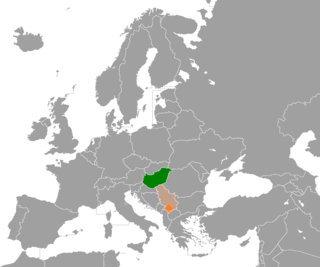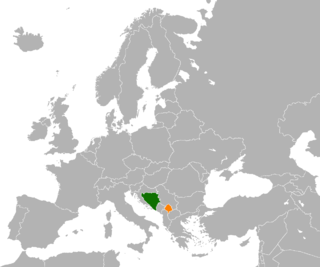The 2008 Kosovo declaration of independence, which proclaimed the Republic of Kosovo to be a state independent from Serbia, was adopted at a meeting held on 17 February 2008 by 109 out of the 120 members of the Assembly of Kosovo, including the Prime Minister of Kosovo, Hashim Thaçi, and by the President of Kosovo, Fatmir Sejdiu. It was the second declaration of independence by Kosovo's Albanian-majority political institutions; the first was proclaimed on 7 September 1990.

International governments are divided on the issue of recognition of the independence of Kosovo from Serbia, which was declared in 2008. The Government of Serbia does not diplomatically recognise Kosovo as a sovereign state, although the two countries have enjoyed normalised economic relations since 2020 and have agreed not to try to interfere with the other's accession to the European Union.

On 17 February 2008, the majority of members of the Assembly of Kosovo, including Hashim Thaçi, and Fatmir Sejdiu, not acting in the capacity of PISG, declared Kosovo an independent and sovereign state. Kosovo was soon recognized as a sovereign state by the United States, Turkey, Albania, Austria, Germany, Italy, France, the United Kingdom, the Republic of China (Taiwan), and others. This triggered an international debate over whether Kosovo's unilateral declaration of independence had set a precedent in international law that could apply to other separatist movements, or whether it is a special case. The recognition of Kosovo's independence by 101 out of 193 UN states, according to many sources, has given fresh impetus to other separatist movements.

The Hungary–Kosovo relations are foreign relations between Hungary and Kosovo. Kosovo declared its independence from Serbia on 17 February 2008 and Hungary recognised it on 19 March 2008. Hungary has an embassy in Pristina.

Kosovo unilaterally self proclaimed independence from Serbia in 2008, a move which Serbia strongly rejects. Serbia does not recognize Kosovo as an independent state and continues to claim it as the Autonomous Province of Kosovo and Metohija. However, differences and disputes remain, while North Kosovo is partially under Serbian rule. Initially there were no relations between the two; but in the following years there has been increased dialogue and cooperation between the two sides.

Accordance with International Law of the Unilateral Declaration of Independence in Respect of Kosovo was a request in 2008 for an advisory opinion referred to the International Court of Justice by the United Nations General Assembly regarding the 2008 Kosovo declaration of independence. The territory of Kosovo is the subject of a dispute between Serbia and the Republic of Kosovo established by the declaration. This was the first case regarding a unilateral declaration of independence to be brought before the court.

Czech Republic–Kosovo relations are foreign relations between the Czech Republic and the Republic of Kosovo. Kosovo declared its independence from Serbia on 17 February 2008 and Czech Republic recognized it on 21 May 2008. The Czech Republic opened an embassy in Pristina on 16 July 2008.

The relations of Bosnia and Herzegovina and Kosovo are unofficial because Bosnia and Herzegovina's central government has not recognized Kosovo as an independent state, essentially through the veto of the Bosnian Serb-dominated Republika Srpska. Bosniak and Croat members of the Presidency want to recognise Kosovo, but Serb members refuse. Bosnia and Herzegovina's constitution requires consensus among all three members in order to perform such an action. Bosnia-Herzegovina remains the only country of the former Yugoslavia that does not recognize Kosovo's independence.
The Belgrade–Pristina negotiations are a series of European Union-facilitated talks between the governments of Serbia and Kosovo. Serbia claims Kosovo as its southern province under United Nations administration, and rejects its independence. Kosovo considers Serbia as a neighbouring state. The negotiations began in March 2011, three years after Kosovo declared independence. They are the first negotiations between the two entities since Kosovo declared independence in February 2008.

Presidential elections were held in Romania in 2014. They were the seventh presidential elections held in post-1989 Romania. In the first round of the elections on 2 November, the top two of the fourteen candidates qualified in a run-off on 16 November. These candidates were Victor Ponta, former Prime Minister and ex-leader of the Social Democratic Party (PSD) who won around 40% of the vote in the first round, and Klaus Iohannis, then mayor of Sibiu and leader of the Christian Liberal Alliance (ACL), who won around 30% in the first round respectively. Following large protests on how Ponta's government organized the elections in the diaspora, Klaus Iohannis staged a surprising come-back and won the run-off with 54.5%, or more than a million votes than his contender.

Kosovo's declaration of independence from Serbia was enacted on Sunday, 17 February 2008 by a unanimous vote of the Assembly of Kosovo. All 11 representatives of the Serb minority boycotted the proceedings. International reaction was mixed, and the world community continues to be divided on the issue of the international recognition of Kosovo. The Russian Federation’s reaction to the 2008 Kosovo Declaration of Independence is one of strong opposition.

Egyptian–Kosovan relations are foreign relations between Egypt and Kosovo.
Kosovo's declaration of independence from Serbia was enacted on Sunday, 17 February 2008 by a unanimous vote of the Assembly of Kosovo. All 11 representatives of the Serb minority boycotted the proceedings. International reaction was mixed, and the world community continues to be divided on the issue of the international recognition of Kosovo.
Kosovo's declaration of independence from Serbia was enacted on Sunday, 17 February 2008 by a unanimous vote of the Assembly of Kosovo. All 11 representatives of the Serb minority boycotted the proceedings. International reaction was mixed, and the international community continues to be divided on the issue of the international recognition of Kosovo. Slovakia's reaction to the 2008 Kosovo declaration of independence is one of non-recognition, but it has given indications that its stance could change in the future.
Kosovo's declaration of independence from Serbia was enacted on Sunday, 17 February 2008 by a unanimous vote of the Assembly of Kosovo. All 11 representatives of the Serb minority boycotted the proceedings. International reaction was mixed, and the global community continues to be divided on the issue of the international recognition of Kosovo. Greece's reaction to the 2008 Kosovo declaration of independence in general is neutral.
Kosovo's declaration of independence from Serbia was enacted on Sunday, 17 February 2008 by a unanimous vote of the Assembly of Kosovo. All 11 representatives of the Serb minority boycotted the proceedings. International reaction was mixed, and the world community continues to be divided on the issue of the international recognition of Kosovo. Ukraine's reaction to the 2008 Kosovo declaration of independence was originally one of neutrality, but it become more strongly opposed to independence during the presidency of Pro-Russian Viktor Yanokovich.

Kosovo's declaration of independence from Serbia was unilaterally declared on Sunday, 17 February 2008 by a unanimous vote of the Assembly of Kosovo. All 11 representatives of the Serb minority boycotted the proceedings. International reaction was mixed, and the world community continues to be divided on the issue, with 114 of 193 UN member states recognizing Kosovo's independence. Spain's reaction to the declaration was, and remains, one of non-recognition. Spain considers that the unilateral declaration of independence "does not respect international law".

Kosovo's declaration of independence from Serbia was enacted on Sunday, 17 February 2008 by a unanimous vote of the Assembly of Kosovo without popular referendum. All 11 representatives of the Serb minority boycotted the proceedings. International reaction was mixed, and the world community continues to be divided on the issue of the international recognition of Kosovo. Libya extended official diplomatic recognition to Kosovo on 25 September 2013. Serbian president Aleksandar Vučić announced in 2023 that Libya has withdrawn recognition of Kosovo.
The First Agreement of Principles Governing the Normalisation of Relations, informally known as the Brussels Agreement, is an agreement to normalize relations between the governments of Serbia and Kosovo. The agreement, negotiated and concluded in Brussels under the auspices of the European Union, was signed on 19 April 2013. Negotiations were led by Serbian Prime Minister Ivica Dačić and Kosovo Prime Minister Hashim Thaçi, mediated by EU High Representative Catherine Ashton. The government of Serbia does not recognize Kosovo as a sovereign state, but began normalising relations with the government of Kosovo as a result of the agreement. In Belgrade, the agreement was criticized by protestors as a convalidation of Kosovo independence.

Kosovan–Singaporean relations are foreign relations between the Republic of Kosovo and the Republic of Singapore. Singapore recognised the Republic of Kosovo as an independent state on 1 December 2016. Kosovo and Singapore established diplomatic relations on 1 December 2016.














